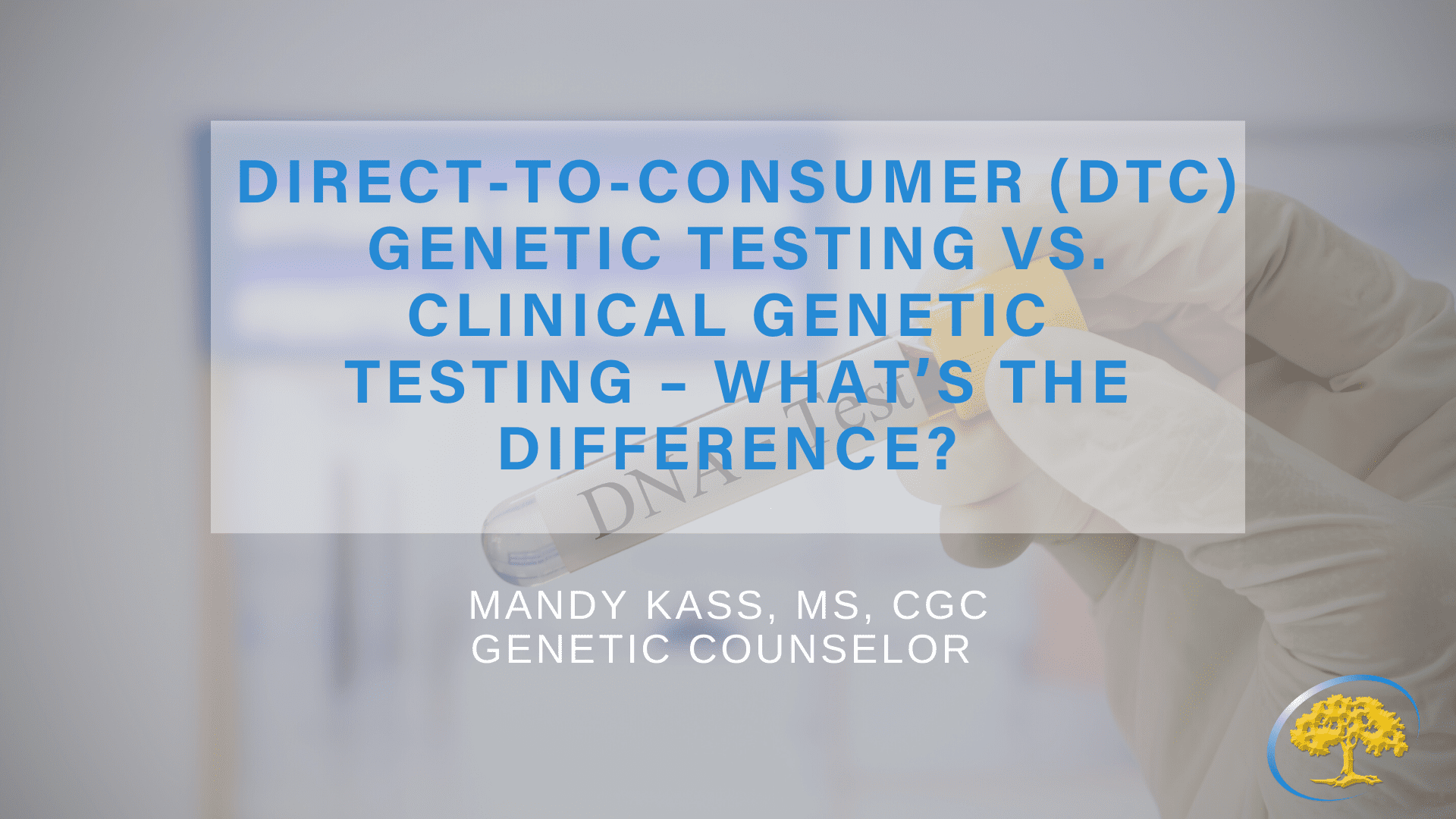
Posted 3 years ago
Direct-To-Consumer (DTC) Genetic Testing vs. Clinical Genetic Testing – What’s the difference?
It is near impossible to turn on the TV without seeing ads from companies wanting to use your DNA to provide information about your ancestry, long lost relatives, and even certain health or personal traits. But how do these direct-to-consumer (DTC) genetic tests differ from what your doctor or genetic counselor may order? If you want to know more about your possible inherited disease risk, why make a trip into the clinic when you can just order the test online yourself, right? Well there are some important things to consider before ordering that test.
 Some DTC companies now offer testing for the risk of certain hereditary diseases that can be passed through the generations of a family. For example, some DTC companies offer testing that provides some information related to hereditary risks for certain cancers, like breast cancer. But the question becomes, is this type of genetic test the best choice to assess your risk for cancer?
Some DTC companies now offer testing for the risk of certain hereditary diseases that can be passed through the generations of a family. For example, some DTC companies offer testing that provides some information related to hereditary risks for certain cancers, like breast cancer. But the question becomes, is this type of genetic test the best choice to assess your risk for cancer?
Clinical genetic testing that is ordered through your doctor’s office or genetic counselor is always the better choice for assessing your inherited disease risk. The increase in interest in DTC genetic tests for inherited cancer risks has been accompanied by an increase in concern regarding a high number of false-positive results (those that incorrectly indicate a disease risk is present when it is not). In fact, some studies suggest that there could be as high as a 40% false positive rate with DTC test results. Given such a large margin in error, the much greater accuracy of clinical genetic testing far outweighs the convenience of DTC testing. Clinical genetic testing is also able to dig much deeper than DTC genetic testing because it utilizes technology that is specifically designed to detect genetic mutations across a multitude of genes associated with hereditary cancer risk.
To better illustrate, picture your genome (all of your unique genetic material) as a book. DTC tests typically use a basic technology called SNP array, which is only able to detect a few specific mutations linked to hereditary cancer risk, while missing many others. You can think of this type of testing as a spell checker that can only detect a small handful of misspelled words in a book. Compare this to clinical genetic testing, which uses a much more advanced technology known as Next Generation Sequencing (NGS). NGS works like a super spell checker, and is able to detect all sorts of spelling mistakes, grammatical errors, or even parts of the book that have been incorrectly added or deleted.
So what kind of test would you rather have to detect an inherited risk for cancer? Clinical genetic testing seems to be the clear winner here. Don’t get me wrong, DTC testing can be entertaining and interesting, but as you can now see, it’s not a sufficient form of testing for assessing hereditary cancer risk. If you have taken a DTC genetic test and received a positive result, indicating that you have an increased risk for cancer, it is recommended that you speak with a genetic counselor or healthcare provider who can offer clinical genetic testing to verify the accuracy of your results. If you have had negative DTC genetic test results in the past, but have a personal and/or family history of cancer, consider speaking to a genetic counselor to better assess your risk.
Mandy Kass, MS, CGC
As a certified oncology genetic counselor, Mandy works with patients who have a personal and/or family history of cancer to assess their risk of having an inherited cancer predisposition. This information allows for the pursuit of early detection or possibly prevention of certain cancer types.
certified oncology genetic counselor, Mandy works with patients who have a personal and/or family history of cancer to assess their risk of having an inherited cancer predisposition. This information allows for the pursuit of early detection or possibly prevention of certain cancer types.
The ultimate goal of cancer genetic counseling is to empower patients to use their personal risk information to better inform treatment and management decisions and to educate family members on their possible cancer risks.
